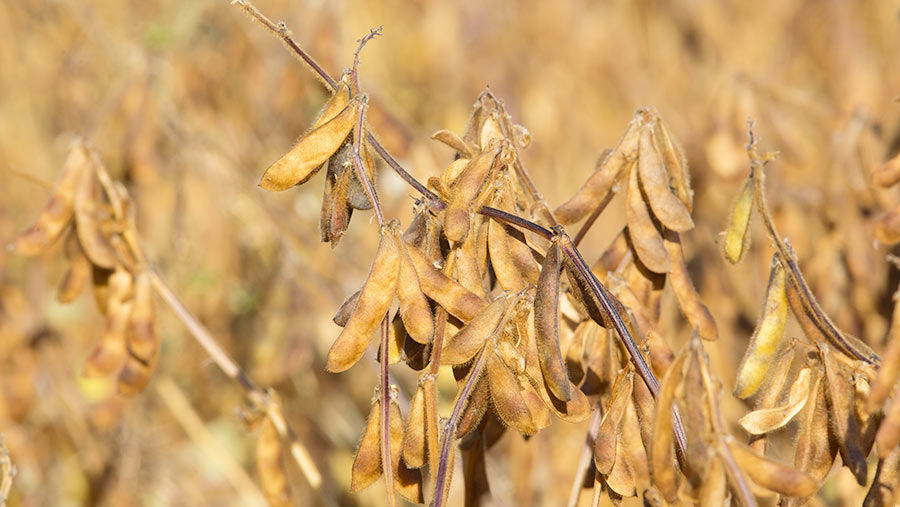Hard-hitting campaign targets soya use in poultry
 © Tim Scrivener
© Tim Scrivener Retailers must help create a market for home-grown protein crops and enable British farmers to rely less on imported soya, according to the Soil Association.
The organic promotion body has launched a campaign targeting soya produced on deforested land in Brazil, using pesticides that are banned in Britain.
However, while the message is supportive of UK agriculture, the campaign’s impactful headline – Stop Poison Poultry – focuses on the British broiler sector.
See also: Britain braced for food crisis as rising costs hammer farmers
The sector is the main agricultural user of soya and the campaign highlights the 1m tonnes imported to feed broilers in the UK each year.
The Soil Association said the increased global demand for soya had prompted Brazil to ramp up soya production, increasing the need for chemical crop controls.
Since 1990, pesticide use has risen by 900% in Brazil, with almost two-thirds of it applied to soya, the organisation added.
These pesticides are often not permitted for UK use because of their risks to the environment and humans, with 70,000 poisonings occurring in Brazil each year.
Farmers not to blame
Despite the campaign’s dramatic title, Soil Association campaigns adviser Cathy Cliff said UK poultry farming was not to blame.
The poisonings are not the fault of British farmers and soya has been a sensible choice from a nutritional perspective, Ms Cliff said.
“Our farmers should be able to purchase feeds that don’t harm biodiversity and communities. So now is the time to invest in UK protein crops and ease our reliance on imported soya.
“Enabling our farmers to source animal feed closer to home will not only create a more resilient farming sector, but will protect nature and the climate,” Ms Cliff said.
And, growing more leguminous protein crops here would also help to reduce reliance on artificial fertilisers and improve soil health, she said.
The Soil Association has launched a petition alongside the campaign, calling on retailers to phase out hazardous pesticides from their soya supply chain by 2030.
The organisation is also asking retailers to commit to scaling up alternative feeds, with the aim of reducing soya use in rations from 20% to 10% by 2030.
Wide of the mark
But Agricultural Industries Confederation head of feed sector James McCulloch said some of the Soil Association claims were wide of the mark.
The UK sources sustainably grown soya from countries such as Canada and the US, Mr McCulloch pointed out. Where it is imported from Latin America, soya is sourced from farms certified under the Amazon Soy Moratorium.
The certification schemes used also include standards for good environmental and farming practice, he added.
“This soya carries a premium to reward growers, so the UK is already directly encouraging better practice,” Mr McCulloch suggested.
As an added security measure, all materials going into animal feed are tested and must reach strict requirements for maximum residue limits of pesticide, he said.
This acts as a further barrier to sourcing feed that has been produced to lower standards.
